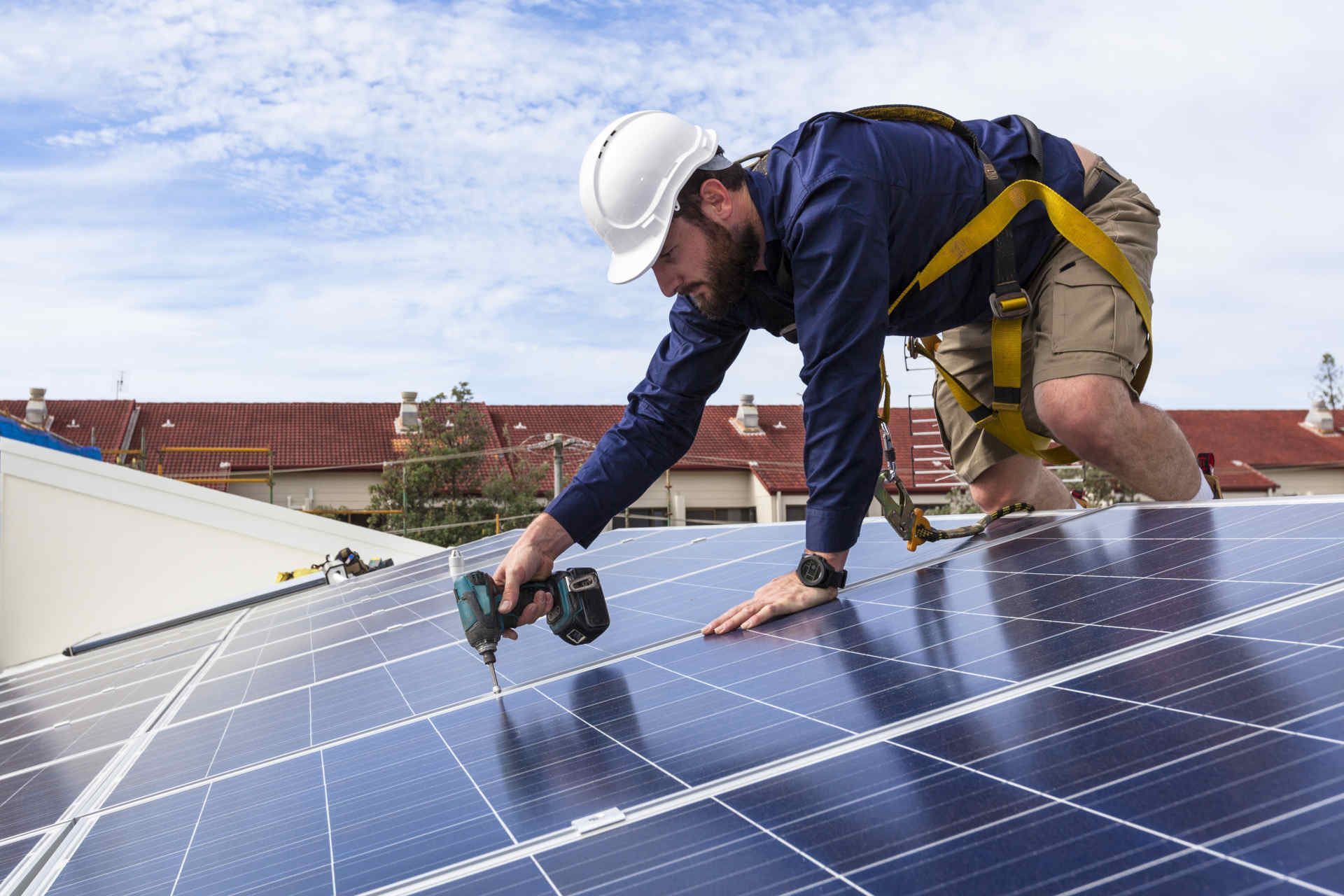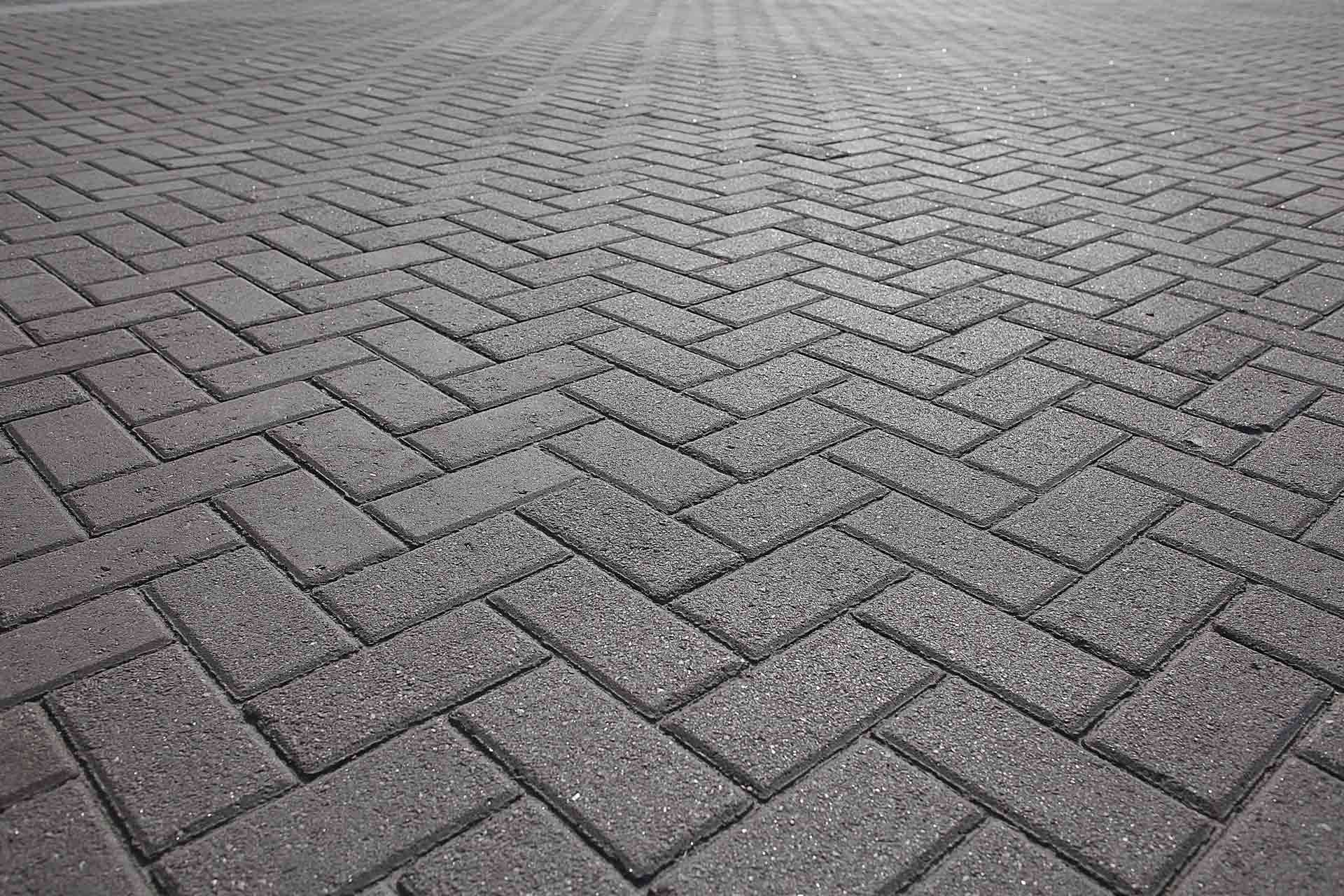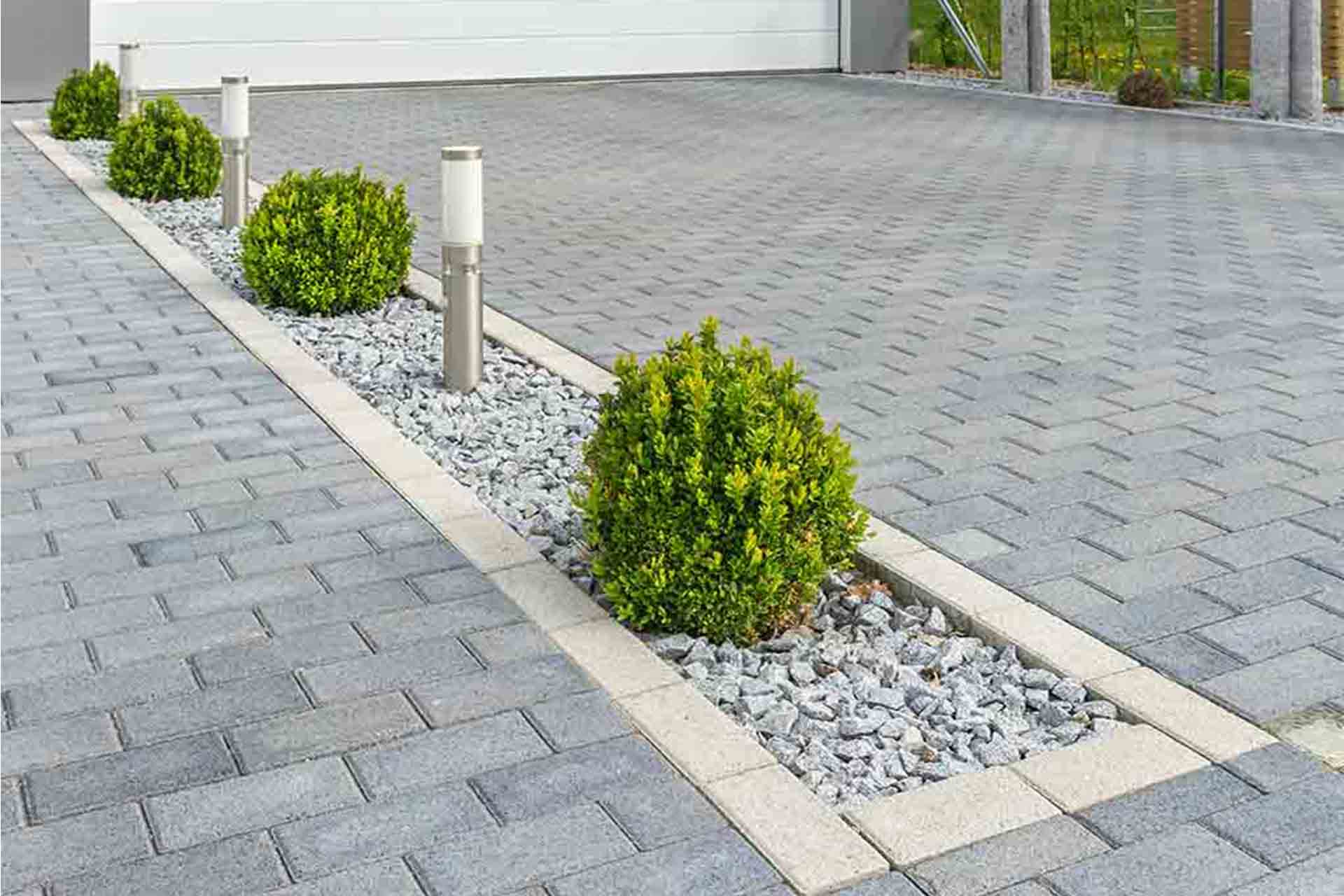Blog>Expert Advice>Porcelain driveways: Everything you need to know
Last updated: 15 February 2024
Porcelain driveways: Everything you need to know
Porcelain may not be the first material you think of when it comes to driveways. But porcelain driveways are a fantastic option that should be on your radar.
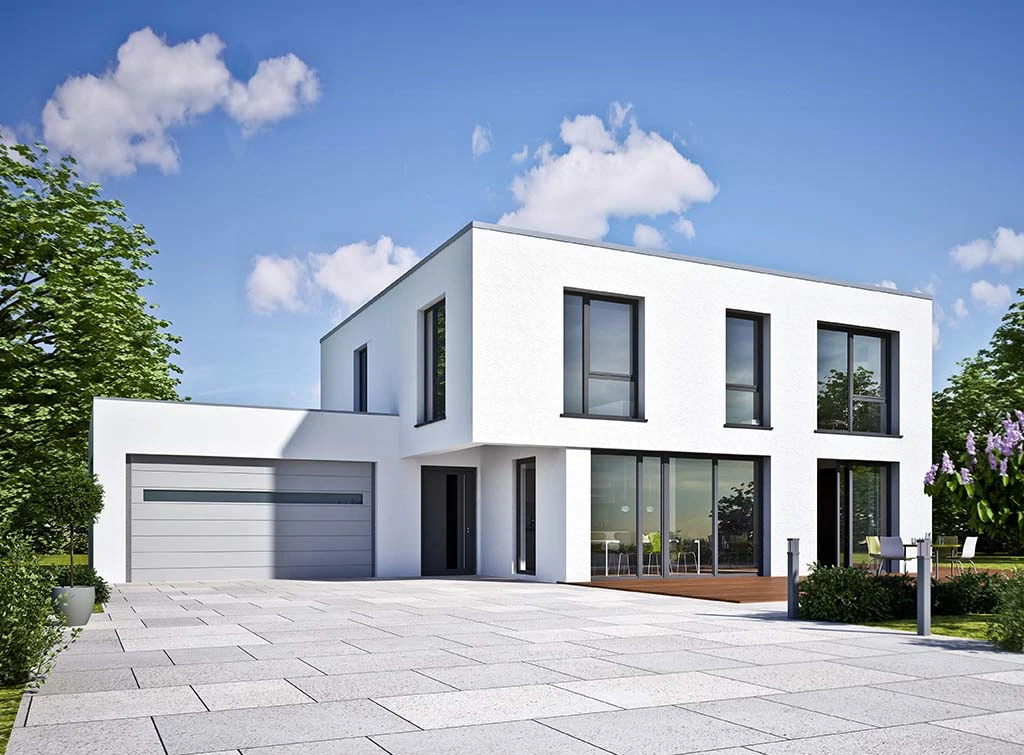
If you want to give your property some kerb appeal, improving your driveway could be the perfect project. In fact, adding a new driveway to your home could even add between 5-10% to the value of your property!
Porcelain driveways are slowly becoming more popular with homeowners as more people are starting to become aware of their unique benefits. Here, we’ll explore everything to do with porcelain for driveways, so you can make a confident choice.
Porcelain for driveways
If you’re looking to get an existing driveway resurfaced – or to install a driveway on your property for the first time – porcelain slabs are worth considering.
While you may be able to use some porcelain bathroom tiles outdoors, porcelain slabs for driveways are typically designed for outdoor use.
In this way, they’re usually thicker and stronger than the porcelain tiles you’d expect to find in bathrooms – making them perfect for high-traffic areas of your garden.
Porcelain outdoor slabs are available in a wide range of colours, textures, sizes, and patterns. However, they’re particularly well suited to contemporary properties, as they’ll give your outdoor space a sleek, modern look.
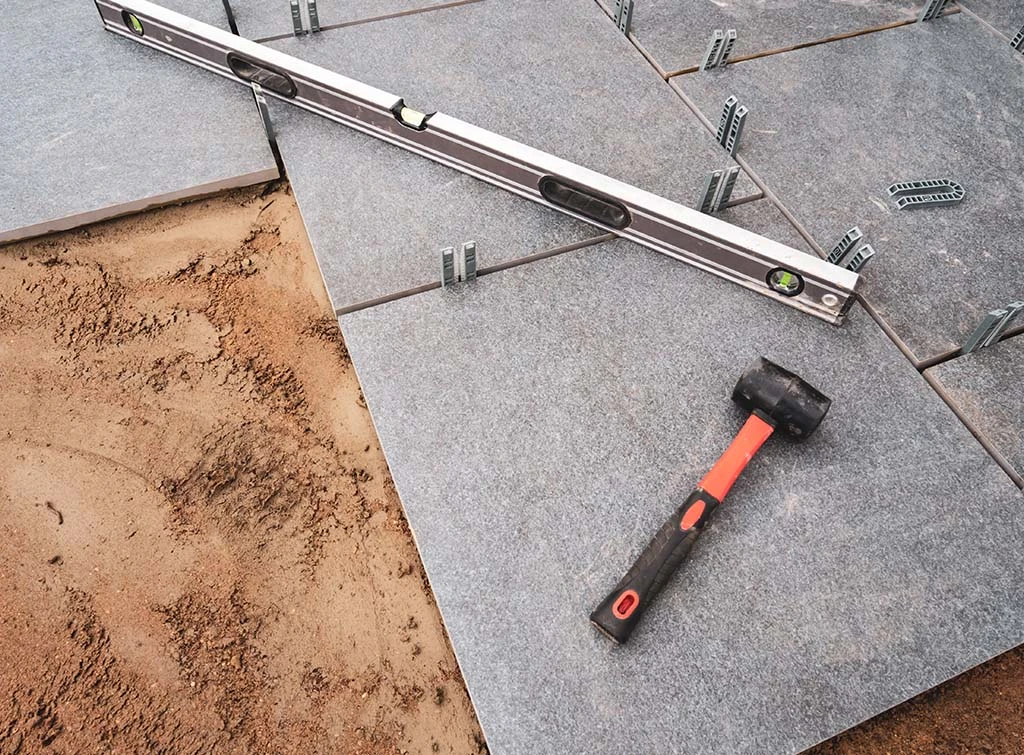
Is porcelain good for a driveway?
Porcelain is a fantastic option for a driveway. Not only do porcelain slabs offer a smart finish, but they’re also long-lasting and durable.
That said, like all the best driveway materials, porcelain has its pros and cons. Here’s the lowdown.
What are the benefits of porcelain driveways?
There are lots of benefits to a porcelain driveway.
1. Long-lasting
As long as your porcelain slabs are of high quality and they’re laid correctly, they should last for several decades. In fact, they could last for up to 50 years!
2. Strong
Porcelain slabs are made from dense natural clays and additives and are fired at very high temperatures. This makes them exceptionally strong and durable.
3. Low maintenance
Porcelain slabs have a very low water absorption rate. This makes them frost-proof and stain-resistant. It also reduces the possibility of moss, mould, and lichen growing.
With that in mind, porcelain driveways should be easy to clean with just a mop and water.
4. Slip-proof
Because moss, mould, and lichen won’t build up on your porcelain slabs, they shouldn’t get slippy. You can also choose slabs with a textured surface to further guard against slipping.
5. Aesthetically pleasing
Porcelain driveways are available in a wide range of colours, textures, sizes, and patterns. You can even choose from a range of effects such as stone or wood.
Better still, porcelain doesn’t fade when exposed to sunlight, so your driveway will look great for many years to come.
See the tradespeople we've checked and recommend for your job
What are the negatives of porcelain slabs?
Although porcelain slabs have tons of benefits, they’re not for everyone.
1. Relatively expensive
Porcelain slabs are on the higher end of the price scale when it comes to driveway materials. They’re more expensive than concrete block paving and some cheaper natural stones, although they cost less than granite.
That said, their longevity and durability could save you money on repair and replacement costs in the long run.
2. Trickier to install
As porcelain slabs are so dense, they can be tricky to cut and drill. Plus, the slabs are usually thinner than natural stone and concrete paving, which means they can be fiddly to lay.
But don’t worry! A professional installer will have all the experience, knowledge, and tools required to install your porcelain driveway to the highest standard.
3. Brittle
Porcelain slabs can be quite brittle, especially if you compare them to concrete paving. This won’t usually be a problem if they’re laid correctly. However, if they’re not properly supported, they can crack under pressure.
How much does a porcelain driveway cost?
| Item | Unit | Cost - low | Cost - high | Cost - average |
|---|---|---|---|---|
| Porcelain driveway slabs | Per m² | £30 | £65 | £47.50 |
| Last updated: May 2024 Our costs are ballpark averages - get a local tradesperson to quote now | ||||
The cost of a porcelain driveway will vary based on several factors, such as the:
Size of your driveway
Quality and thickness of the slabs
Colour and pattern of the slabs
Location
That said, the average cost of porcelain slabs is around £47.50 per m².
This is around the same price as some kinds of natural stone paving and slightly more expensive than concrete paving.
Check out our guide to driveway paving costs for more comparisons.
Porcelain driveways key takeaways
Porcelain driveways are low-maintenance, aesthetically pleasing, and extremely durable
They’re more expensive than concrete driveways but their durability and longevity make up for it
Porcelain slabs are trickier to install compared to other materials, but a professional will be able to complete the job to a high standard
Ready to get a porcelain driveway installed?
Enter your postcode below to find the best driveway paver near you.
See the tradespeople we've checked and recommend for your job
FAQs
Is porcelain paving slippery when wet?
No. Porcelain paving has a very low water absorption rate, which prevents moss, algae, and mould from growing on it. This stops the paving from becoming slippery when wet, although you can also choose a more textured design to further prevent slips.
Does porcelain paving crack?
Porcelain paving shouldn’t crack if it’s been properly installed. However, it’s a relatively brittle material, so it can crack if it isn’t adequately supported.
Can you lay 20mm porcelain on a driveway?
Yes! 20mm porcelain slabs are commonly used on driveways and are ideal for these high-traffic areas. However, some manufacturers also make 30mm porcelain slabs, which are even thicker and more durable.
Do you need drainage for porcelain paving?
Yes. Any new driveway that’s bigger than 5m² will need to have adequate water drainage – and that includes porcelain driveways.
Your installer should be able to create a 15mm fall in the sub-base to meet drainage requirements. Alternatively, linear drainage channels can help to direct the flow of water.
See the tradespeople we've checked and recommend for your job
More Expert Advice Articles
More Driveway / Patio Design Articles
See the tradespeople we've checked and recommend for your job

